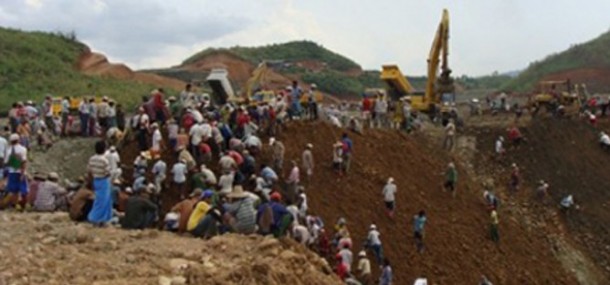The ongoing conflict between the Burmese army and the Kachin Independence Organization (KIO) has over the past few months forced thousands of civilians to flee from their homes in western Kachin state’s jade-rich Hpakant region.
The latest figures compiled by the United Nations on Sept. 3 estimate that there are currently 4,100 internally displaced people or IDPs living in 24 temporary camps in the the Hpakant area. Local relief workers suggest however that the actual number may be as much as double the UN’s estimate.
Despite the worsening humanitarian crisis in Hpakant, access to the the growing displaced population remains extremely difficult for the UN and other international NGOs. Most relief work in the area is currently being performed by local religious groups.
Aye Win, the UN’s chief information officer for Burma, said that government authorities recently asked UN agencies and their partner organizations to “respond to the situation in the area.” Heavy fighting continues in Hpakant on a near-daily basis however and it remains unclear when or if the UN will be able to deliver humanitarian aid to those in need.
In the meantime, access to shelter for those displaced in Hpakant remains a major concern. “Partners reported that shelter is a first priority as churches and monasteries in Hpakant can no longer accommodate the increasing number of IDPs. Food and medicines are also needed in all temporary camps,” Aye Win told The Irrawaddy via email.
The Hpakant region is often referred to as the world’s only major source of true jadeite characterized by vivid green colours and translucency. Most of the jade harvested in Hpakant is destined for Chinese buyers either in the mainland or elsewhere in Southeast Asia, a practice that according to scholars dates back to at least the 15th century when the Ming dynasty regularly dispatched eunuchs to buy jade from Burma.
For most of the KIO’s 1961 to 1993 conflict with Burma’s military, the rebel group controlled the bulk of Hpakant’s jade mines, earning the KIO huge revenues to support its armed struggle. Under a 1994 ceasefire agreement reached with the junta and brokered by Gen. Khin Nyunt, the KIO officially relinquished its right to profit from the jade industry.
During the ceasefire, royalties from the jade trade provided huge sums for Burmese government authorities, and according to official statistics was regularly the third-largest annual earner for the regime after natural gas and timber sales. The demise of the KIO ceasefire last year ended the government’s jade monopoly and the KIO is once again collecting levies on jade mining in Hpakant.
In May, Burmese military authorities made a move to prevent the KIO from profiting from the jade industry by ordering all large mining machinery including diggers and bulldozers out of the Hpakant area. The KIO responded by ordering mining firms to disobey this order, and some machinery has remained. Despite the renewed conflict, mining operations are still taking place in parts of Hpakant under the control of the KIO.
Over the past few weeks the Burmese military has suffered significant losses in Hpakant at the hands of the KIO. An Aug. 29 explosion at a mine compound in Hpakant that was commandeered by military forces is reported to have killed at least 50 government troops. An initial explosion at the mine set of by the KIO caused explosives stored at the site to go off killing scores of Burmese troops. According to a KIO official interviewed by The Irrawaddy, the firm that operated the mine is partially owned by Daw Kyaing Kyaing, the wife of retired Snr-Gen Than Shwe.
Daw Kyaing Kyaing isn’t the only military crony said to be involved in the Hpakant region’s jade industry. A Leaked US diplomatic cable from June 2009 reveals that Zaw Zaw, owner of the Max Myanmar Group and head of the Myanmar Football Federation, ran the Lone Khin
jade mine “in conjunction with the Ministry of Mines and recently received an additional 50 acres of land in [Hpakant] for jade mine development.” Other Burmese tycoons including Tay Zaw are also believed to have mining interests in Hpakant.
The jade pits of Hpakant are infamous for unsafe working conditions including frequent landslides and cave-ins. Many mine managers are said to pay their staff with amphetamines and heroin. The high rate of intravenous drug use among Hpakant’s large migrant work community has been attributed as the main reason for the for the area having one of the highest rates of HIV/AIDS in Asia.
Adrian Levy and Cathy Scott-Clark, co-authors of a 2001 book “Stone of Heaven: The Secret History of Imperial Green Jade” described their visit to Hpakant during the 1990s in stark terms as a drug-infested moonscape rife with human misery. According to Levy and Scott-Clark: “Hpakant is Burma’s black heart, drawing hundreds of thousands of people in with false hopes and pumping them out again, infected and broken.”

















